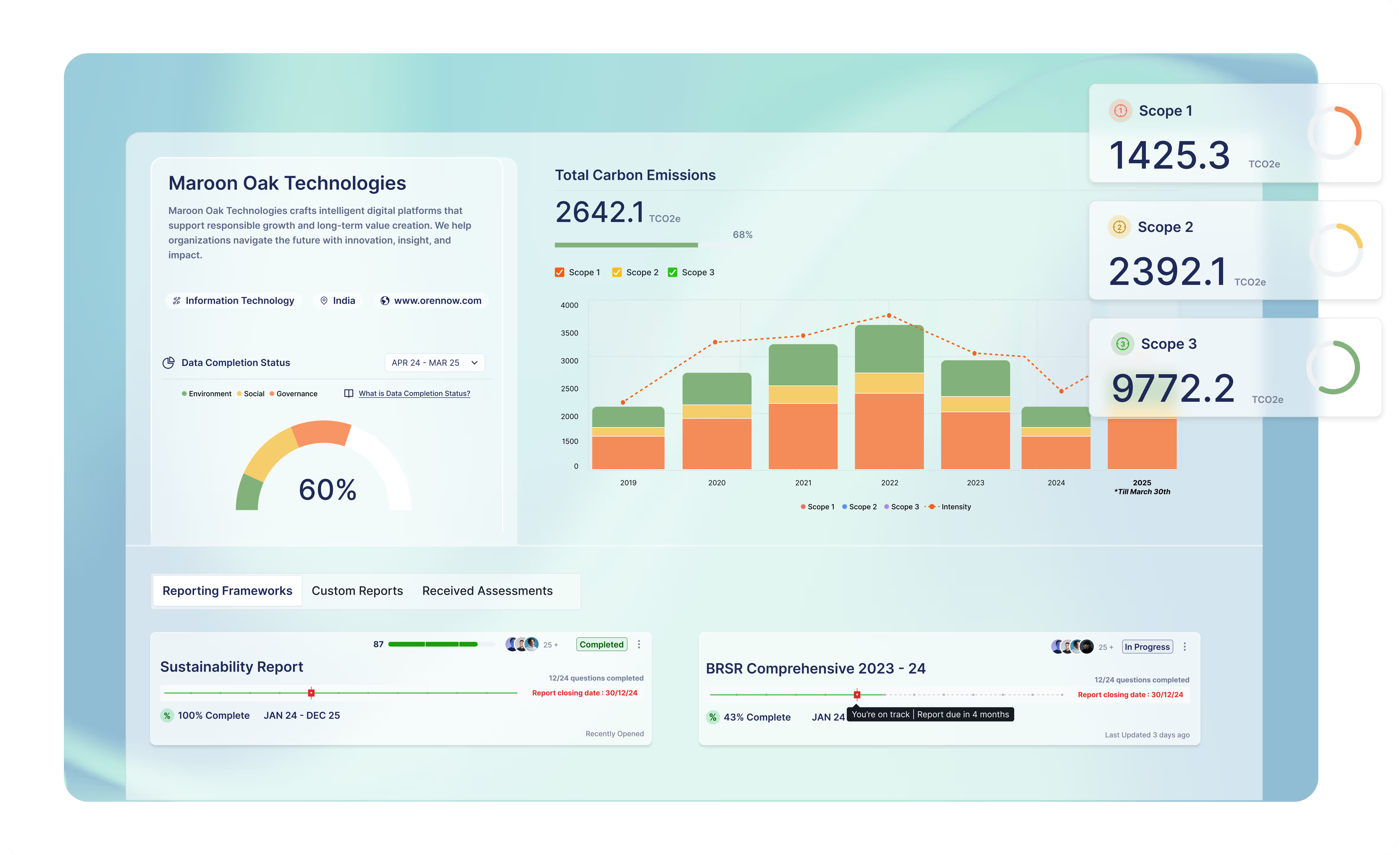ESG Reporting in the GCC: Trends and Challenges 2025

In recent years, the Gulf Cooperation Council (GCC) region, which includes Bahrain, Kuwait, Oman, Qatar, Saudi Arabia, and the United Arab Emirates (UAE), has experienced a significant shift toward embracing ESG (Environmental, Social, and Governance) principles. This transition is driven by growing investor interest, regulatory developments, and an increasing recognition of the importance of sustainable business practices. Governments and financial institutions in the region have prioritised aligning with international ESG standards to attract foreign investment and ensure long-term economic resilience. This article provides a comprehensive overview of the ESG reporting landscape in GCC countries in 2025, examining key developments, challenges, and future trends.
The Evolution of ESG Reporting in the GCC
Early Developments (Pre-2020)
Before 2020, ESG awareness in the GCC was relatively low. The region’s heavy reliance on fossil fuels often took precedence over broader sustainability concerns, and the absence of formal ESG frameworks led to limited transparency and accountability. Traditional investment strategies focused primarily on short-term financial returns, with few incentives for businesses to integrate ESG considerations. However, some ESG-related initiatives began to emerge through corporate social responsibility (CSR) programs, voluntary sustainability disclosures, and industry-driven sustainability efforts.
Key Milestones (2020-2025)
In response to the increasing global focus on sustainability, GCC countries have introduced regulatory frameworks and mandatory reporting requirements:
- Bahrain: Initially implemented voluntary ESG reporting guidelines in 2020, which later evolved into a structured regulatory framework.
- Saudi Arabia: Tadawul, the Saudi stock exchange, launched sustainability disclosure guidelines in 2021, encouraging corporate alignment with global best practices.
- United Arab Emirates (UAE): The Securities and Commodities Authority (SCA) mandated ESG reporting for publicly listed firms in 2022, driving widespread adoption.
- Qatar: The Qatar Stock Exchange (QSE) introduced ESG reporting guidelines in 2022 and launched an ESG index to track corporate sustainability performance.
- Kuwait: Boursa Kuwait issued voluntary ESG reporting guidelines in 2021, followed by the Capital Markets Authority implementing sustainability regulations in 2022.
- Oman: The Muscat Stock Exchange (MSX) introduced voluntary ESG disclosure guidelines in 2023, with mandatory sustainability reporting set to begin in 2025 as part of Vision 2040.

Country-Specific ESG Reporting Landscape in 2025
1. United Arab Emirates (UAE)
- Regulatory Framework: The SCA enforces mandatory ESG reporting for listed companies, enhancing corporate transparency.
- Abu Dhabi Global Market (ADGM): Introduced the Sustainable Finance Regulatory Framework in 2023, aligning with international standards such as ISSB and TCFD.
- Net Zero by 2050 Initiative: Encourages corporations to develop net-zero emissions plans and engage in green finance initiatives.
- Dubai Financial Market (DFM): Provides sustainability guidelines for listed entities, fostering increased investor engagement.
2. Saudi Arabia
- Tadawul Saudi Stock Exchange: Launched ESG Disclosure Guidelines in 2021 to standardise reporting.
- Saudi Green Initiative: A SAR 700 billion (≈187 billion USD) investment in sustainability projects, including afforestation and renewable energy.
- Vision 2030: Integrates ESG principles across multiple sectors.
- Public Investment Fund (PIF): Prioritises ESG-centric investments in renewable energy, technology, and infrastructure.
3. Qatar
- Qatar Stock Exchange (QSE): Established a sustainability platform in 2018, which evolved into a robust ESG reporting framework.
- Qatar Financial Market Authority (QFMA): Implements governance regulations that mandate ESG disclosures.
4. Kuwait
- Boursa Kuwait: Issued the ESG Reporting Guide in 2021.
- New Kuwait 2035 Vision: Embeds ESG considerations into economic diversification initiatives.
5. Oman
- Muscat Stock Exchange (MSX): Introduced detailed ESG guidelines covering 30 reporting metrics.
- Vision 2040: Prioritises sustainability and economic diversification.
- Mandatory ESG Reporting: Required for publicly listed companies starting in 2025.
- Sustainable Finance Framework: Supports green bonds and sustainability-linked financial instruments.
6. Bahrain
- Central Bank of Bahrain (CBB): Enforced ESG reporting requirements for listed corporations and financial institutions in 2024.
- Reporting Scope: Covers Scope 1, 2, and 3 greenhouse gas emissions, aligning with the Global Reporting Initiative (GRI).
- Commitment to UN Sustainable Development Goals (SDGs): Ensures alignment with international sustainability objectives.
.webp)
Predominant ESG Reporting Standards and Frameworks
- Task Force on Climate-related Financial Disclosures (TCFD): Provides guidelines for reporting climate-related risks and opportunities.
- Global Reporting Initiative (GRI): A widely adopted framework ensuring standardised and comprehensive disclosures.
- Sustainability Accounting Standards Board (SASB): Focuses on industry-specific materiality considerations.
- IFRS Sustainability Disclosure Standards (ISSB): Establishes a global benchmark for sustainability-related financial disclosures.
- UN Sustainable Development Goals (SDGs): Offers a framework for embedding ESG initiatives within broader global objectives.
Challenges in ESG Reporting for GCC Companies
Despite progress, GCC companies continue to face several challenges in ESG reporting:
- Regulatory Divergence: The lack of standardised ESG frameworks across the region creates inconsistencies.
- Data Availability and Accuracy: Limited access to reliable ESG data affects the credibility of disclosures.
- Workforce Expertise: There is a shortage of trained ESG professionals, highlighting the need for targeted training initiatives.
Strategies to Enhance ESG Reporting
To improve ESG reporting practices, companies in the GCC should consider:
- Materiality Assessment: Prioritising ESG factors most relevant to business operations.
- Digital Transformation: Leveraging ESG reporting platforms like the Oren Sustainability Hub for enhanced accuracy.
- Third-Party Assurance: Implementing independent verification to strengthen report credibility.
- Stakeholder Engagement: Collaborating with investors and regulators to refine ESG reporting frameworks.
Future Outlook for ESG Reporting in the GCC
The evolution of ESG reporting in the region will be shaped by key trends:
- Technology Integration: AI-powered analytics and SaaS platforms will streamline ESG disclosures.
- Regulatory Evolution: Stricter mandates for publicly listed companies are expected.
- Investment Trends: Institutional investors will prioritise sustainability-focused businesses.
- Climate Risk Integration: Companies will be expected to conduct comprehensive climate risk assessments and develop net-zero strategies.
Conclusion
As GCC economies continue to embed ESG principles within corporate and financial landscapes, 2025 marks a pivotal year for sustainability in the region. Strengthened regulations, heightened investor scrutiny, and the widespread adoption of international best practices will solidify ESG reporting as a fundamental component of responsible business conduct.
Governments and financial institutions are implementing more stringent disclosure requirements, while corporations are increasingly integrating sustainability into their core strategies. This transformation not only enhances corporate transparency and accountability but also fosters long-term economic resilience, positioning the GCC as a leader in sustainable business practices on the global stage.





